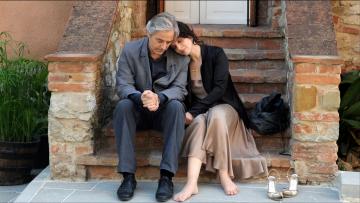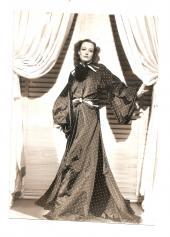'Certified Copy' explores duplication of art, life
An attractive fortysomething Frenchwoman stumbles in late -- dragging her furious teenage son behind her -- to a stuffy Brit's lecture in Florence. He's there, as briefly as possible, to promote his seminal new work on original works of art vs. copies. The Great Author was, in fact, late for the book-signing himself and is so distracted that, at one point, he interrupts his own remarks to take a cell phone call.
Cell calls not only punctuate but positively pepper "Certified Copy," whose brilliant writer-director Abbas Kiarostami delights in their useful interruptions. This Iranian master never met a novel narrative device he didn't like: If he can put an action, plot twist or embellishment in a mirror, window-glass reflection or one-sided phone conversation -- rather than in front of the camera -- he'll do so. His is the fine art of indirection as much as direction.
The direction of the writer's career, by contrast, seems as generic as his boring name, James Miller (played by William Shimell). But at least he has a name. His edgy French fan (Juliette Binoche) is just "elle" -- she. We never hear or learn her given name, nor that of "fils" -- her son.
There's nothing boring or generic, though, about the performances or script. Inexplicably drawn to the pretentious author, the seemingly starstruck woman contrives to meet and lure him into a trip to a quaint Tuscan village. She's nervously deferential -- he, condescending -- at first. But in the car, churches and museums along the way, she gets gradually more combative -- he, more worried about whether she'll get him back to his getaway train on time. Soon enough, they're arguing mightily, almost like an old married couple, and we're wondering whether maybe she's some kind of wacko stalker.
Their Big Issues? The difference between an original and a copy, a copy and a fake, and the dual meanings of "copy" and "reproduction" in nature as well as art: (1) a duplicate or (2) propagation of the species. People are DNA reproductions of their ancestors. One speaks of "copies" of one's book. Copies have no more or less intrinsic value than originals. And an "original" art work is just a copy of something real -- some person or landscape -- in the first place! What matters is not the originality but the perception.
Uh-huh. And by the way, Elle's and James' relationship itself might or might not be
genuine, may or may not be role-playing. Is she a real or faux fan?
As you gather, much if not most of the "action" here is mental, not physical, and takes place outside or alongside the main frame -- starting with the terrific opening hand- signaled subtext of Elle's texter-with-terrible-teeth kid (superb Adrian Moore), who perceives everything and waits to grill his mother about it later. That, plus the pervasive invasive cell calls compounding her natural attention deficit, plus a running gag about bride-and-groom photography, adds enough toner to make this "Copy" a rich black comedy as well as melodrama all the way.
Everybody's chronic impatience comes to a head in a huge contretemps at a trattoria, where James is so enraged about the mediocre wine that he fails to notice Elle's newly applied lipstick and earrings. He stomps out, and she sits devastated, watching him pace around outside during -- what else? -- a cell phone call. Shades of the late great John Cassavetes & Gena Rowlands semi-improvisational epics here, and throughout.
Mr. Kiarostami and his camera adore the exquisite Miss Binoche ("Unbearable Lightness of Being"), as well they should, lingering long on her features, fascinating little nervous tics, pauses and speech mannerisms -- in three languages! Constantly switching in mid-conversation, trilingual Elle speaks unaccented English to James, perfect French to her son, and fluent Italian to random villagers, who turn out to be the only characters with any useful insight or wisdom to offer the protagonists between spats. "He's not into anything but himself and his job," Elle complains to an old waitress. "Well," the lady replies, "if our rival is not another woman, we make it his job -- or something else."
James -- perfectly played by the Mastroianni-type Shimell -- gives Elle a wide range of options to choose from. Their real bottom line is a tragicomic truism: Things change -- but people usually don't. If we were a bit more tolerant, we'd be less alone.
"Certified Copy," which opens today at the Regent Square, is an elegantly cut gem for those who eschew violence, vampires, CGI, F/X, intergalactic disasters, 3- or 4-D, saga sequels, talking mammals, and Hollywood's other usual suspects. It's a film-lover's house of un-American activities. Of the two basic bittersweet outcomes, will theirs be the sweeter or bitterer? Be prepared for the less likely one.
What are people if not just flesh-and-blood objets, pathetically dependent on other people's perspective and perception? We're objets. But are we d'art?






